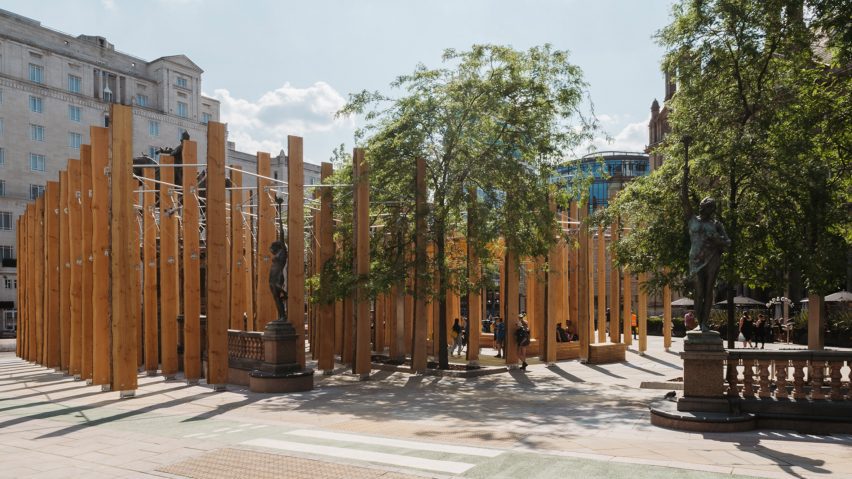Architecture practice Studio Bark has collaborated with artist Michael Pinsky to create the wooden Making A Stand installation, which aims to explore material life cycles and "stand in solidarity with climate protestors".
Comprised of 127 six-metre-tall vertical wooden fins, the temporary installation was arranged in a grid around Leeds City Square's existing trees, street furniture and sculptures.
Making A Stand aims to encourage conversations around material life cycles and highlight the need for the construction industry to replace carbon-intensive materials, such as concrete and steel, with materials like timber.
The installation, which the studio described as a "sculptural forest", was made from Douglas fir timber, a type of wood commonly used in construction, which was taken from the UK forestry supply chain at a point between felling and stacking.
It is set to be repurposed when the installation is deconstructed at the end of the year.
"Each Douglas fir fin can even be traced back to the precise stump in the forest using a unique code, which will enable us to track the journey of its lifecycle for many years to come," Studio Bark director Wilf Meynell told Dezeen.
"The fins work together with a webbed canopy of steel wire ropes and steel struts to ensure minimal damage to the wood so that it can be repurposed at the end of the year," Meynell explained.
"These fins are not supported at the base but instead rely on an intricate network of tension wires and compression rods positioned at the tree canopy level," Pinsky told Dezeen.
"The canopy is made from five six-metre Douglas fir trusses with a lightweight polycarbonate roof. We plan to follow these materials into their future life, so we can measure the true impact of Making A Stand over its lifecycle," said Meynell.
The stark contrast between the natural and the man-made is highlighted through the visibility of both the rough texture of the bark and the cut edge of sawn timber on each of the wooden fins.
"Making A Stand sees the natural world and the urban realm collide, linked through the supply chain that connects one to the other," Meynell said.
"Leeds was [originally] a small fortified settlement within the ancient forest of Leodis," he added. "The river and timber were the two main resources that decided the settlement."
"Today, with the burgeoning of global supply chains, we have lost touch with where our materials and products come from," Meynell continued.
The installation also acts as a physical structure for pedestrians to interact with and a symbol of solidarity with climate change protestors.
"Making A Stand offers pedestrians a quiet place to pause, shelter and sit," said Meynell.
"We hope that some may take this time to contemplate the accelerating complexity of global supply chains, their impact on the natural environment and the role trees and forests have to play in replacing atmospheric carbon," he added.
"Beyond the pure physical presence in the square, we wanted to create an installation that would 'stand' in solidarity with climate protestors around the world, who are facing increasing state repression."
Other recent projects by Studio Bark featured on Dezeen include an accessible wooden house on a farmstead in Hampshire and a home extension in Essex built using a flat-pack U-build system.
The photography is by Ellen Christina Hancock and Tom Joy.
Making A Stand is on display from 15 June 2023 to January 2024 in Leeds City Square as part of Leeds 2023 Year of Culture. See Dezeen Events Guide for an up-to-date list of architecture and design events taking place around the world.
Project credits:
Co-creators: Studio Bark and Michael Pinsky
Commissioners: Leeds 2023
Timber: Whitney Sawmills
Fabrication: Stage One Creative Services Ltd
Engineering support: Structure Workshop Ltd (concept) and Allt Environmental (fabrication)

